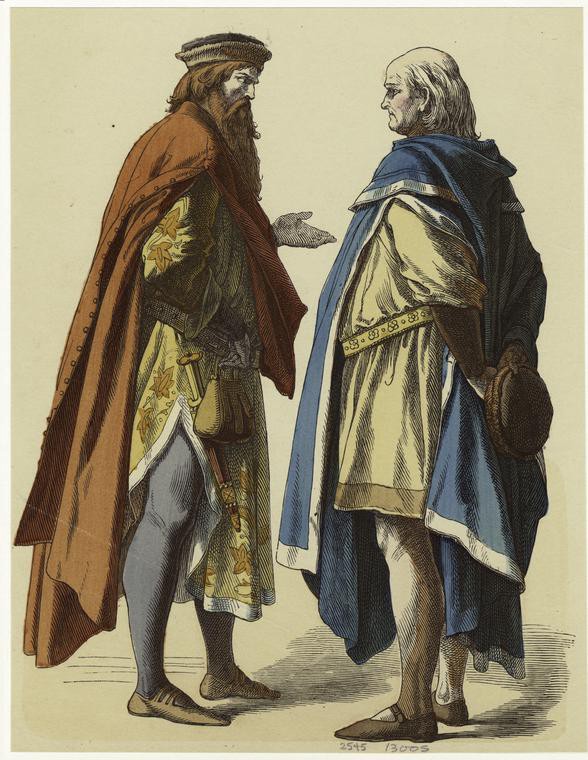The Merchant and the Coat

Once there was a man with a fine old coat that he wore everywhere he went. It had been handed down over many years in his village, and though it had grown a little frayed and faded with age it still protected him from the cold and kept him safe from the elements. Almost everyone agreed that it was the best coat you could wear, and many wished they had a coat just like it.
Now one day all the men from the town took one of their regular trips into the city. They passed through all the shops in the market, they changed money at the bank, and they generally took care of all the business they had come for. They were about to leave when they crossed the path of a wealthy merchant and his retinue.
The wealthy merchant eyed the man’s coat covetously. A bloated and unkempt member of his retinue whispered something in his ear.
“Say there,” said the wealthy merchant, “that coat has seen better days. Perhaps you should let me try it on. I am a wealthy merchant, and I know many things. I will make your coat better. See these loose buttons? I will make sure they don’t hang slack anymore. See this ripped lining? I will repair it so that you never see a tear.”
The man was nervous and unsure. To begin with, the buttons were not loose at all, and the lining seemed fine to him. Also, there seemed something untrustworthy about the wealthy merchant and his retinue. He consulted with his townsmen to see what he should do.
“Say no,” said the butcher. “The wealthy merchant is dangerous. I don’t think he is right in the head, either. See how unsteady on his feet he is. See how he keeps admiring himself in his hand mirror.”
“Say no,” said the baker. “I have heard that the wealthy merchant isn’t even all that wealthy, and what money he has comes from unsavory practices. He will surely steal the coins from your pockets and use them to enrich himself and his family.”
“Say no,” said the silversmith. “I don’t trust the men who congregate around him. That rumpled fellow with the red face and the shifty eyes seems dangerous and full of anger. Also, I have heard it whispered that the manager of money he has with him there secretly paid the local oaf to batter our town’s recorder of deeds.”
The man was prepared to politely decline the wealthy merchant’s request, when another member of his party spoke up.
“Say yes,” said the ploughman, who had grown jealous of the coat and worried that when it was next passed on it would not go to someone like him. “The wealthy merchant has a great deal of money, and surely he must be very wise to have accumulated such wealth. Only he can fix your coat.”
Before the man could protest that his coat did not need mending, the trader spoke up. “I also believe you should let him wear it. Why not take a chance?” Now the trader did not think that the wealthy merchant would really repair the coat, but he was fairly certain that while the wealthy merchant was wearing it money would fall out of the pockets which he, the trader, could grab.
So against the greater part of his judgment — against the far greater part of his judgment — the man handed his coat to the wealthy merchant, who smiled as if he had never been more pleased with himself and put it on. He immediately tore all the buttons from the coat and dug them into the ground with his heel. Then he tore out the lining and ripped it into little pieces in front of the group.
“He is ruining my coat,” shouted the man.
“Give him a chance,” said the trader. “He is only doing what he said he would do.”
“But he broke all the buttons and rent the lining asunder.”
“I’m sure he has his reasons and besides,” said the ploughman, “I didn’t see that and I don’t believe it when you tell me he did.”
The man returned to his home in anguish and despair. What could he do to get his coat back? And would it still be worth having when he got it? Even if he were able to wear it again, everyone would know that the wealthy merchant had worn it and they would never look at it the same way again. It had been tainted and stained. The man cried out in grief.
“The wealthy merchant got that coat fair and square,” yelled the ploughman, who had been passing by, through the window. “Stop being such a baby about it.”
The man spent several days in shock. He could not eat or sleep. His every moment was consumed with concern for his coat and worry over how he might take possession of it once more. Finally, he went to the wisest man in town, the doctor, and asked for advice.
“Now that the wealthy merchant has the coat I am not supposed to give you any aid,” said the doctor, “but let me tell you this: The only ones who can save you now are the women of the town. Go ask them for help.”
So the man went to find the women, but they were already gone. They didn’t want the wealthy merchant to have the coat either so they had taken it on themselves to get the coat back. And the moral of the story is that men are idiots and eventually they wind up needing the women to bail them out from the doltish things they do.
